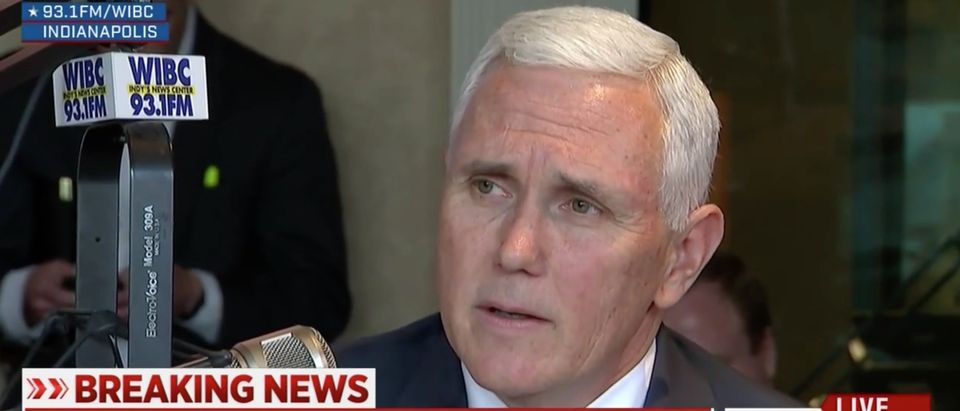Why are Indiana governor Mike Pence and Donald Trump huddled in not-so-secret vice-presidential talks?
It might be summed up in a simple slogan. “Things go better with Koch.”
The Koch in question is the pair of Kansas-based oil barons and conservative mega-donors who are searching for an ideological standard-bearer they can live with, now that Trump is all-but certain to be the GOP nominee.
Governor Pence, who originally backed Cruz for president, but then switched to Trump after the billionaire real estate mogul won his state’s primary, is known to be extremely close to the Kochs, who have come to admire the former Indiana congressman for his fiscal conservatism, opposition to abortion and Obamacare, and support for energy deregulation.
By contrast, the Kochs have thus far withheld major financial support from Trump, and appear to be less than enthusiastic about Chris Christie and Newt Gingrich, the other two men thought to be in top consideration for the VP slot. Christie’s past support for abortion rights and his one-time public embrace of Obama have raised the hackles of the right, and Gingrich is still viewed as an unreliable gadfly by virtually the entire GOP.
The prospect of either man inheriting the mantle of leadership after Trump may be too much for many hard-line conservatives like the Kochs to bear.
Trump is also struggling to win over Christian evangelicals who see the staunchly pro-life Pence as one of their own. Trump’s beginning to close the gap, according to GOP insiders, but he needs to reassure party delegates who might be tempted to challenge him at the GOP convention in Cleveland that he’s not planning to “go rogue” on social issues after he wins in November
How close is Pence to the Kochs? Pence regularly speaks at public and private events sponsored by Americans for Prosperity, the organization founded by the Kochs to push for tax cuts and jobs promotion in states like Indiana. He’s openly supported AFP’s activities in his home state and has publicly praised the Kochs for their “contribution to this country and to Indiana, in particular.”
In fact, the Kochs were planning to back a Pence campaign for the presidency in 2016 before the one-time Indiana congressman decided not to enter the race.
Having him in the VP slot may be the next best thing.
The Kochs’ antipathy toward Trump is well-known. Charles Koch has spoken out strongly against his stance on Muslim immigration and has questioned his commitment to life. They once contemplated backing Rand Paul because of a shared antipathy toward foreign military intervention, and later leaned toward backing Marco Rubio. While die-hard conservatives, they also have a fierce independent streak, which has led them to support a bipartisan campaign for criminal justice reform.
Earlier this year, some conservatives approached the Kochs to try to fund a high-profile “dump Trump” movement on behalf of Rubio or Cruz. But the Kochs actively resisted those efforts, saying “it’s not what we do.” They’ve also had their differences with Cruz. Some members of the Koch network have backed Trump, but not the two brothers. The theory is that Pence’s presence on the ticket will help close the deal.
For Trump, allying with Pence is mainly a marriage of convenience. Faced with a Clinton fundraising juggernaut, the reality TV star needs to develop a serious base among conservative donors to supplement the free publicity generated by mainstream news coverage and his own social media campaign. And in addition to evangelicals, he needs to rally other movement conservatives, many of whom are still holding out for Cruz.
Pence, unlike Gingrich or Christie, is not a household name. But he has the Washington legislative experience that Trump says he needs in a running mate. He’s also in a position to nail down Indiana, a traditional Red-leaning state that Obama managed to claim in 2008. Trump already faces Clinton encroachment in several smaller Red States like Utah and Mississippi (6 electoral votes each) and can’t afford to cede an even larger prize (11 electoral votes) to his rival.
Trump has insisted he won’t formally announce his VP running mate until the GOP convention. But all bets are off if he goes with Pence. He’ll need time to introduce his running mate to mainstream voters and to consolidate their joint candidacy before he arrives in Cleveland. And an early announcement could also help mobilize Trump-wary conservatives to turn out in full force even if their one-time favorite Cruz decides to withhold his endorsement, or even refuses to attend.


